Women's History Month: First women lawyers, judges around the world
Duke Law celebrates pioneers who shattered glass ceilings and challenged societal norms to practice law and empower the next generation of women lawyers and judges.
Duke Law School celebrates Women's History Month with a reflection on women recognized as the first women lawyers and judges in America and around the world. These pioneers defied centuries of tradition, convention, and custom-- even petitioning Congress and the president of the United States -- to earn their place in the legal profession and in history.
Florence Allen
 The first woman to serve on the highest court in any state, Florence Allen was appointed to serve on the Supreme Court of Ohio in 1922. During her career in the law, she also became one of the first two women to serve as a United States federal judge.
The first woman to serve on the highest court in any state, Florence Allen was appointed to serve on the Supreme Court of Ohio in 1922. During her career in the law, she also became one of the first two women to serve as a United States federal judge.
Born in Salt Lake City and raised in Cleveland, Allen grew up learning Greek and Latin at home with her father, a professional linguist. Although she initially pursued studies to become a concert pianist, an injury sidelined this career path and Allen chose to explore her interests in politics and law. She earned a law degree from New York University Law School in 1913.
After law school, Allen returned to Cleveland, where she passed the Ohio bar and started her own practice. In the decades that followed, she became well-known attorney and advocate for women's rights, eventually appointed to serve as Assistant Prosecutor of Cuyahoga County in 1919 and elected judge of the Court of Common Pleas in 1920.
After serving on the Ohio Supreme Court, Justice Allen became the first woman to serve on a federal court of appeals when President Roosevelt appointed her to the Sixth Circuit of the U.S. Court of Appeals. She went on to become chief judge before retiring in 1959. In 2005, Justice Allen was inducted into the National Women's Hall of Fame.
[Sources: Ohio History Connection, Wikipedia]
Meaza Ashenafi
Meaza Ashenafi is a highly accomplished attorney and judge, as well as an advocate for protecting and empowering women. Of note, she became the first woman to be appointed by the Federal Parliamentary Assembly as president of the Federal Supreme Court of Ethiopia in 2018.
 Born in 1964 in the small town of Asosa, Ethiopia, Ashenafi went on study at Addis Ababa University, where she was the only woman in her class during the first year. She earned a Bachelor of Laws at AAU and went on to earn a Master of Arts degree in international relations and gender studies at the University of Connecticut.
Born in 1964 in the small town of Asosa, Ethiopia, Ashenafi went on study at Addis Ababa University, where she was the only woman in her class during the first year. She earned a Bachelor of Laws at AAU and went on to earn a Master of Arts degree in international relations and gender studies at the University of Connecticut.
Ashenafi first worked with the judiciary through a recruitment program that trained graduates as assistants in preparation to be judges. She was appointed judge of the Federal Supreme Court of Ethiopia in 1989. In 1993, Ashenafi was appointed legal adviser by the Ethiopian Constitution Commission and gained notoriety as a leading voice for the protection of women's and children's rights.
In 1995, she founded the Ethiopian Women Lawyers Association, a non-profit group providing legal aid and protection to disadvantaged women–particularly victims of gender-based violence–and campaigning for stronger protections and equality for women under Ethiopian law.
In the 2000s, Ashenafi helped establish the Fighting for Women's Rights in Ethiopia group and the Enat Bank, the first bank founded by women in Ethiopia. Ashenafi has been named a Hunger Project Award laureate, won the Grassroots Ethiopian Women of Substance Africa Prize, and was nominated for the Nobel Peace Prize in 2005.
[Sources: U.S. Bureau of Educational and Cultural Affairs, Institute for African Women in Law, Wikipedia]
Jane Bolin
 In 1939, at the age of 31, Jane Bolin became the first Black woman to serve as a judge in the U.S. Bolin did not know she was going to be sworn in as a judge, though, when she was called to appear before Mayor Fiorello H. La Guardia at the New York World's Fair on July 22, 1939.
In 1939, at the age of 31, Jane Bolin became the first Black woman to serve as a judge in the U.S. Bolin did not know she was going to be sworn in as a judge, though, when she was called to appear before Mayor Fiorello H. La Guardia at the New York World's Fair on July 22, 1939.
Bolin is the first Black woman to graduate from Yale Law School and the first Black woman to join the New York City Bar Association. Early in her career, Bolin was not welcomed when she sought work at the City of New York's law department, according to a Los Angeles Times report. Still, in 1937, she became the first Black person to serve as an assistant corporation counsel in New York City.
Following her appointment, Bolin was the only Black woman working as a judge in the U.S. for 20 years. She served four 10-year terms on the bench of New York Family Court and was noted for working to reform skin-color-based assignments for probation officers and end segregation in child placement facilities.
Bolin served on the boards of the National Association for the Advancement of Colored People and the New York Urban League and was a legal advisor to the National Council of Negro Women.
[Sources: Biography, Los Angeles Times archives, Wikipedia]
Eliza Stewart Boyd
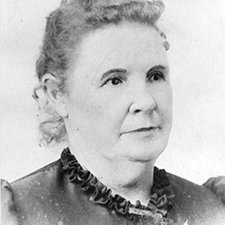 In 1870, Eliza Stewart Boyd became the first woman in America ever selected to serve on a jury after being called to a murder case in Laramie, Wyoming. Shortly after the jury convened, five other Laramie women made history as the first women in the world to serve on a trial jury.
In 1870, Eliza Stewart Boyd became the first woman in America ever selected to serve on a jury after being called to a murder case in Laramie, Wyoming. Shortly after the jury convened, five other Laramie women made history as the first women in the world to serve on a trial jury.
A veteran teacher, Boyd is known as the first teacher at Laramie public schools as the first classes began in February 1869. She was a member of the organizing committee for the Wyoming Literary and Library Association, helping to draft its constitution and became a charter member of the organization. In 1873, she became the first woman in Wyoming to be nominated to run for the Territorial legislature, though she declined the nomination.
Over the years, Boyd remained active as a charter member of the Women's Christian Temperance Union in Laramie in 1883 and one of two Wyoming delegates selected to the Prohibition Party's national convention in February 1888.
[Sources: Wyoming History Day, Alexander Street, Wikipedia]
Genevieve Cline
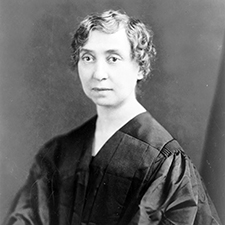 In 1928, Genevieve Cline became the first woman to serve on a federal bench. President Calvin Coolidge nominated her as an Article I federal judge to the U.S. Customs Court. Cline served in that role for 25 years, becoming known as an early advocate for consumer protection and women's rights, including the suffrage movement.
In 1928, Genevieve Cline became the first woman to serve on a federal bench. President Calvin Coolidge nominated her as an Article I federal judge to the U.S. Customs Court. Cline served in that role for 25 years, becoming known as an early advocate for consumer protection and women's rights, including the suffrage movement.
Prior to her judgeship, Cline earned a Bachelor's in Law degree from Baldwin-Wallace College in Ohio in 1921 and then went into private practice with her brother, John. The following year, President Warren Harding appointed Cline to serve as appraiser of merchandise at the port of Cleveland. She served in that capacity for six years, becoming the first woman to work as an appraiser of merchandise for the U.S. Customs Service.
Cline also held a six-year term as president of the Cleveland Federation of Women's Clubs and chaired the Ohio Federation of Women's Clubs for two years.
[Sources: U.S Courts, Encyclopedia, Ohio History Connection, Wikipedia]
Belva A. Lockwood

One of the first woman lawyers in the U.S., Belva A. Lockwood was a noted attorney, author, and advocate for women's rights during the mid-to-late 1800s. She is the first woman admitted to practice law before the Supreme Court, after successfully challenging "custom" before Congress in 1879.
Lockwood was one of 15 women who enrolled at National University Law School in 1871. After completing the program, she was told she would not be given a diploma because of her gender. A year later, Lockwood appealed the matter to President and then-chancellor ex officio Ulysses S. Grant, receiving her diploma a week later and going on to gain admittance to the District of Columbia bar.
In late 1880, Lockwood became the first female lawyer to argue a case before the Supreme Court, with Kaiser v. Stickney and later United States v. Cherokee Nation. In 1884 and 1888, Lockwood ran for president as the candidate for the National Equal Rights Party.
[Sources: U.S Supreme Court, Britannica, Wikipedia]
"I don't think of myself as a woman lawyer. I think of myself as a lawyer. Then I get on with it! I suppose my appointment is good for me and good for women. I hope it's good for the legal profession and good for solicitors."
Constance Baker Motley
Constance Baker Motley, the first Black woman nominated to the federal bench in 1966, is an often-unsung hero of America's civil rights movement. The first Black woman to argue before the U.S. Supreme Court, Motley won nine of her ten cases and assisted in nearly 60 cases that reached the Court.
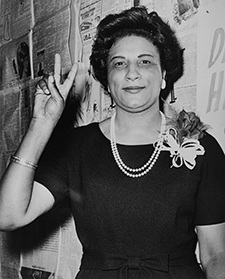 Motley grew up in New Haven, Conn., where her mother, Rachel Baker, founded the New Haven NAACP group. In 1943, she earned her bachelor's degree from New York University and went on to earn a law degree from Columbia Law School in 1946. During her second year at law school, Motley clerked for future Supreme Court Justice Thurgood Marshall.
Motley grew up in New Haven, Conn., where her mother, Rachel Baker, founded the New Haven NAACP group. In 1943, she earned her bachelor's degree from New York University and went on to earn a law degree from Columbia Law School in 1946. During her second year at law school, Motley clerked for future Supreme Court Justice Thurgood Marshall.
In 1946, Motley went to work as a civil rights lawyer at the NAACP Legal Defense and Educational Fund (LDF). In 1950, Motley penned the original complaint in the school segregation case Brown v. Board of Education. During her time with LDF, she defended civil rights notables including Rev. Dr. Martin Luther King Jr. and the Freedom Riders, as well as James Meredith in his pursuit to attend and integrate the University of Mississippi in 1962.
In 1964, Motley became the first Black woman elected to the New York State Senate. Within two years, Judge Motley was appointed by President Lyndon B. Johnson to serve in the U.S. District Court for the Southern District of New York.
"I was the kind of person who would not be put down," Judge Motley wrote in her 1965 autobiography Equal Justice Under Law. "I rejected any notion that my race or sex would bar my success in life."
[Sources: Connecticut History, U.S Courts, Wikipedia]
Ellen Gracie Northfleet
Ellen Gracie Northfleet is the first woman to be appointed to the Supreme Court of Brazil and the Court's first woman president. She also served as a judge of Brazil's Federal Court of Appeals and presiding judge of the country's National Justice Council.
 Judge Northfleet is a Fulbright Scholar and earned her law degree from the Federal University of Rio Grande do Sul in 1970. She started her career as a clerk for the Rio Grande do Sul State General Counsel and moved on to the Ministério Público Federal in 1973. In 1989, Northfleet left the Ministério Público as a federal prosecutor and started working with the judiciary as a judge in the Regional Federal Court of the 4th Region.
Judge Northfleet is a Fulbright Scholar and earned her law degree from the Federal University of Rio Grande do Sul in 1970. She started her career as a clerk for the Rio Grande do Sul State General Counsel and moved on to the Ministério Público Federal in 1973. In 1989, Northfleet left the Ministério Público as a federal prosecutor and started working with the judiciary as a judge in the Regional Federal Court of the 4th Region.
In November 2000, President Fernando Henrique Cardoso appointed Northfleet as the first woman to serve on the Supreme Federal Court. She served as Chief Justice from 2006 to 2008.
Northfleet is known for innovating the Brazilian judicial system with technological improvements to the case filing and management systems, the introduction of the Stare Decisis system in a civil law jurisdiction, and the increased use of alternative dispute resolution models.
Currently, Northfleet is on the Board of Directors of the World Justice Project, an independent, multidisciplinary organization working to advance the rule of law worldwide.
[Sources: World Justice Project, Wikipedia]
Sandra Day O'Connor
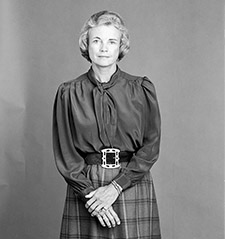 "Society as a whole benefit immeasurably from a climate in which all persons, regardless of race or gender, may have the opportunity to earn respect, responsibility, advancement, and remuneration based on ability." A well-known statement by Justice Sandra Day O'Connor, who shattered the glass ceiling at America's highest court when she became the first woman appointed to the U.S. Supreme Court in 1981. She remained on the Court until her retirement in 2006.
"Society as a whole benefit immeasurably from a climate in which all persons, regardless of race or gender, may have the opportunity to earn respect, responsibility, advancement, and remuneration based on ability." A well-known statement by Justice Sandra Day O'Connor, who shattered the glass ceiling at America's highest court when she became the first woman appointed to the U.S. Supreme Court in 1981. She remained on the Court until her retirement in 2006.
Early in her career, Justice O'Connor found many law firms would not hire her because of her gender. She found work as deputy county attorney in San Mateo, Calif.—offering to do so without salary and sharing an office with a secretary. O'Connor served as assistant attorney general of Arizona from 1965 to 1969, in the Arizona Senate from 1969 to 1974, and was appointed to the Maricopa County Superior Court in 1974. She served there until 1979, when she was elevated to the Arizona State Court of Appeals.
During her time on the Supreme Court, Justice O'Connor's well-respected and meticulously researched opinions often moderated the sharply divided bench. She was noted for her views at the intersection of women's rights and abortion rights, which were cautiously articulated in several rulings, including Webster v. Reproductive Health Services (1989) and Planned Parenthood of Southeastern Pennsylvania v. Casey (1992).
In 2009, Justice O'Connor was awarded the Presidential Medal of Freedom by President Barack Obama.
[Sources: Britannica, History, Wikipedia]
Mahla Pearlman
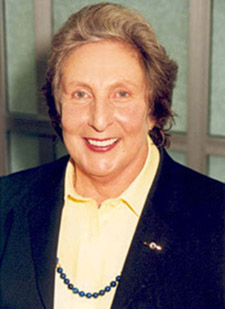
An Australian lawyer, Mahla Pearlman is the first woman chief judge over a jurisdiction within the state of New South Wales, Australia. She was appointed to the NSW Land and Environment Court 1992 and served in this role until 2003.
"I don't think of myself as a woman lawyer. I think of myself as a lawyer. Then I get on with it! I suppose my appointment is good for me and good for women. I hope it's good for the legal profession and good for solicitors," Pearlman said at the time of her appointment, according to the Australian Women's Registry.
Pearlman received her law degree from the University of Sydney in 1960 and was admitted as a solicitor in March of that same year. She went on to achieve two firsts for women in the 1980s: first woman president of the Law Society of New South Wales in 1981 and the first woman president of Law Council of Australia in 1989.
In recognition of her meritorious service to the legal profession, Pearlman was made a Member of the Order of Australia in 1985. In 2004, she was awarded the Centenary Medal for service to law and made an Officer of the Order of Australia "for service to the law and the judiciary, to the development of professional practice standards, and to the community."
Posthumously, the Law Council of Australia established the Mahla Pearlman Award to honor young lawyers who make a significant contribution to environmental law.
[Sources: Australian Women's Register, Law Council of Australia, Wikipedia]
Tcheng Yu-hsiu
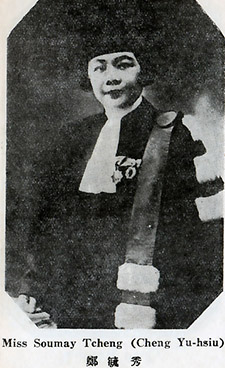 Tcheng Yu-hsiu is the first woman lawyer and judge in China's history, and a noted social and gender revolutionary.
Tcheng Yu-hsiu is the first woman lawyer and judge in China's history, and a noted social and gender revolutionary.
Born in 1891, Yu-hsiu grew up in the coastal province of Guangdong. Early on, she defied many cultural traditions, including the ancient custom of foot binding, and refused an arranged marriage because it conflicted with her personal beliefs and aspirations.
Relocating to France in her teens, she made a home in Paris in 1914 and went on to enroll at the University of Paris to study law. She gained notoriety in 1917, when she returned to China to advocate for Chinese aid to the Allied effort in World War I. In 1919, she was selected as the sole female Chinese delegate to attend the Paris Peace Conference.
Yu-hsiu received her doctoral degree from the Faculty of Law of Paris in 1926. Along with Wei Tao-ming, her legal partner and eventual spouse, Yu-hsiu returned to Shanghai and they established a law practice. That same decade, Yu-hsiu briefly became a judge in the French extraterritorial courts in Shanghai.
Yu-hsiu went on to serve in the national Legislative Yuan, working to draft the Chinese Republican-era civil code. She served as president of Shanghai University Law School from 1931 to 1937.
[Sources: Google Arts & Culture, DC Writers' Homes', Wikipedia]